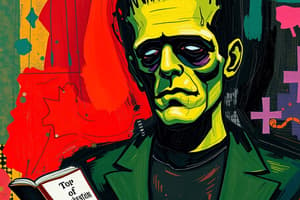Podcast
Questions and Answers
What does the phrase 'a terrifically desolate scene' describe?
What does the phrase 'a terrifically desolate scene' describe?
What do the pines symbolize in relation to Victor's mood?
What do the pines symbolize in relation to Victor's mood?
They reflect his guilt and severity following Justine's death.
What does the sun represent in the monster's speech?
What does the sun represent in the monster's speech?
The phrase 'rain poured from the dark sky and added to the melancholy' is an example of pathetic fallacy.
The phrase 'rain poured from the dark sky and added to the melancholy' is an example of pathetic fallacy.
Signup and view all the answers
What does the simile 'the sea of ice rising like the waves of a troubled sea' convey?
What does the simile 'the sea of ice rising like the waves of a troubled sea' convey?
Signup and view all the answers
How is the monster depicted in relation to Christ?
How is the monster depicted in relation to Christ?
Signup and view all the answers
According to Victor, how does man compare to nature?
According to Victor, how does man compare to nature?
Signup and view all the answers
What does Victor express a desire for when addressing nature?
What does Victor express a desire for when addressing nature?
Signup and view all the answers
What does the statement 'I was benevolent [...] You, my creator, abhor me' signify about the monster's change?
What does the statement 'I was benevolent [...] You, my creator, abhor me' signify about the monster's change?
Signup and view all the answers
What allegory does the monster refer to when he states 'I ought to be thy Adam; but I am rather the fallen angel'?
What allegory does the monster refer to when he states 'I ought to be thy Adam; but I am rather the fallen angel'?
Signup and view all the answers
What does the phrase 'it is in your power to recompense me' indicate about the monster's relationship with Victor?
What does the phrase 'it is in your power to recompense me' indicate about the monster's relationship with Victor?
Signup and view all the answers
What is John Locke's view of people according to 'Ruston 2007'?
What is John Locke's view of people according to 'Ruston 2007'?
Signup and view all the answers
What critique does Shelley provide regarding 'Hindle 2003'?
What critique does Shelley provide regarding 'Hindle 2003'?
Signup and view all the answers
Study Notes
Scene of Isolation and Guilt
- Victor's retreat to nature is described as a "terrifically desolate scene," depicting beauty in absence but underscoring his grief and guilt.
- The landscape's somber pines mirror Victor's mood, offering a serious yet treacherous environment due to guilt from Justine's death.
The Monster's Plea
- The monster implores Victor to hear his story before the sun sets, symbolizing the moral journey and foreshadowing the monster's eventual downfall, akin to Satan's fall.
Foreshadowing and Mood
- Pathetic fallacy is used as rain adds to the scene's melancholy, indicating the monster's impending entrance and Victor's internal turmoil caused by his own deeds.
- A simile compares the sea of ice to "troubled sea," reflecting Victor's disturbed perspective of nature as he battles the consequences of his actions.
The Monster as a Christ-like Figure
- The monster claims the "desert mountains and dreary glaciers" as his refuge, alluding to biblical themes where Jesus seeks solitude before his ministry, suggesting the monster's potential to reveal truths about humanity.
Nature's Influence
- Victor argues that man's supposed superiority is illusory, as nature serves to remind him of human mortality, emphasizing man's inferiority within the grandeur of the natural world.
Victor's Despair
- Victor's expression to "Wandering Spirits" showcases his deep yearning for escape from societal responsibilities, preferring death to returning to a flawed reality.
The Monster's Transformation
- The monster's reflection on being once benevolent yet abhorred highlights a significant moral transformation, with Victor portrayed as the ultimate source of rejection and responsibility.
Miltonic Allusion
- The monster compares himself to both Adam and the "fallen angel," expressing feelings of betrayal by Victor. He articulates a sophisticated understanding of his situation, garnering sympathy despite his status as a creation.
Power Dynamics
- The monster presents Victor with a moral choice, addressing him with a God-like reverence while simultaneously critiquing human fallibility, suggesting that nature's destructive force aligns with the monster's potential rage.
Philosophical Insights
- Locke's concept of humanity as a "tabula rasa" suggests that individuals are shaped by their experiences, reflecting the monster’s development and transformation.
- Shelley's exploration of creative power critiques the risks associated with unchecked ambition and abstraction in human endeavors.
Studying That Suits You
Use AI to generate personalized quizzes and flashcards to suit your learning preferences.
Description
Explore key concepts from Chapter 10 of Frankenstein through this set of flashcards. Each card highlights important words and their meanings, revealing Victor's complex relationship with nature and his emotional state. Enhance your understanding of the themes and language used by Mary Shelley.




